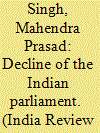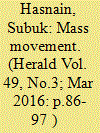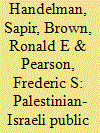| Srl | Item |
| 1 |
ID:
141503


|
|
|
|
|
| Summary/Abstract |
Indian Parliament had a very promising start and worked well during the1950s-1960s. During the 1970s Parliament was squeezed by a great extra-parliamentary mass movement against authoritarianism and corruption and partial but crippling subversion of parliamentary-federal Constitution during the national emergency. Democracy was restored following the 1977 general elections. But the general decline of Parliament that set in the post-Nehru era has not yet been reversed. Major indicators of this decline are shortening sessions, time lost due to disruptions in proceedings by the opposition and violation of norms and precedents by the government, rampant absenteeism, actual hours of sitting as a percentage of available hours, phenomenon of weak legislative federalism via Rajya Sabha in the overall setting of parliamentary-federalism, challenges of new extra-parliamentary mass movements, and judicial activism. The new committee system introduced since 1993 is a welcome development. However, the parliamentary reforms recommended by the constitutional review commission (2002) remain unimplemented.
|
|
|
|
|
|
|
|
|
|
|
|
|
|
|
|
| 2 |
ID:
037800


|
|
|
|
|
| Edition |
1st edn
|
| Publication |
Bombay, Popular Prakashan, 1978.
|
| Description |
193p.hbk
|
| Series |
Towards Total Revolution no;3
|
|
|
|
|
|
|
|
|
|
|
|
Copies: C:1/I:0,R:0,Q:0
Circulation
| Accession# | Call# | Current Location | Status | Policy | Location |
| 017600 | 954.05/BRA 017600 | Main | On Shelf | General | |
|
|
|
|
| 3 |
ID:
145333


|
|
|
| 4 |
ID:
151623


|
|
|
|
|
| Summary/Abstract |
Despite policy commitments and legislated mechanisms, the system of participatory democracy in post-1994 South Africa is largely considered to have failed. In order to understand how underlying ideas can help to explain weaknesses in practice, this article examines how participatory democracy is understood by the ruling African National Congress (ANC). It shows that the multiple intellectual traditions shaping the participatory model have led to a set of policy initiatives that are not without internal tension. In part, the technocratic creep associated with improving public sector performance has stymied participatory efforts by placing efficiency and delivery over democracy and empowerment. Alongside this, however, the ANC's own conception of ‘democracy’ remains interwoven with its mass movement history – linking the role of popular participation to the extension of its own hegemony. The intent of policy to deepen democracy through structures of participatory governance is thus undermined by a teleological framing of participation as an intra-movement activity.
|
|
|
|
|
|
|
|
|
|
|
|
|
|
|
|
| 5 |
ID:
110028


|
|
|
|
|
| Publication |
2012.
|
| Summary/Abstract |
This paper draws lessons from the role played by the black church in creating support for the US civil rights movement in relation to the struggle to involve the Palestinian and the Israeli people directly in the peacemaking efforts to resolve their tragic conflict. The civil rights struggle in both the US and South Africa eventually engaged large segments of the public in both productive debate and campaigning. The corresponding impetus now is to create a major Palestinian-Israeli public negotiating congress that can involve ordinary citizens on both sides in the peacemaking efforts. The Minds of Peace Experiment, a small-scale Palestinian-Israeli public negotiating assembly, is designed to demonstrate the peacemaking power of a subsequent major congress. The exercise, which has been conducted around the US, Canada, and the Middle East, succeeded in creating peacemaking coalitions that are based on commitment to promote the culture of peace. The question is: how can you transform this peacemaking effect into a mass movement? The American black church movement as well as the South African mass mobilization can offer important indications of effective strategy.
|
|
|
|
|
|
|
|
|
|
|
|
|
|
|
|